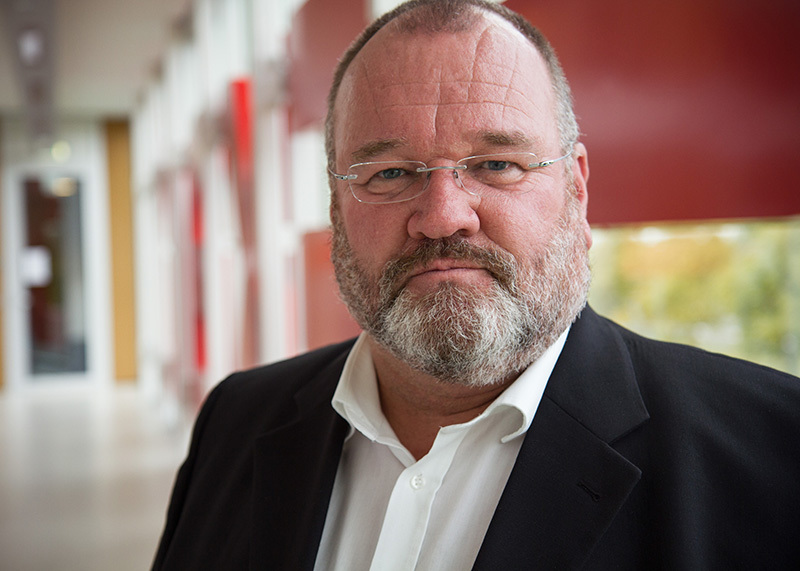
‘CLIC can be a driving force for urban logistics in the AMA’
Dr. Walther Ploos van Amstel is lecturer on City Logistics at the Amsterdam University of Applied Sciences. He is convinced that CLIC will make a real difference in the Amsterdam Metropolitan Area and, in the long run, on a global level. ‘CLIC is no dumb hub. CLIC thinks from the perspective of what a sector really needs.’
How will we benefit from the City Logistics Innovation Campus?
‘It will become increasingly difficult for transport companies to enter the Amsterdam Metropolitan Area. In 2025, the Amsterdam city centre will be an emission-free zone, where heavy lorries will no longer be allowed. New residential and office neighbourhoods in the region will become restricted traffic zones. At the same time, a huge number of delivery vehicles will be entering the area: vehicles for delivering packages, stocking shops, removing waste, and delivering meals. The trend is towards smaller deliveries, delivered more frequently, and just on time. There will be an acute shortage of suitable and sustainable space at the edge of the city for the right kind of urban logistics. Without this kind of space, it will not be possible to combine flows or to enter the city with electrical vehicles and cargo bikes. If the necessary steps are not taken, it will simply become too costly for companies to make deliveries to the city.’
How does that work in practice?
‘Companies often simply do not know how long it will take to get into the city and therefore bet on slack, in other words extra vehicles and extra time to create a buffer. After all, nobody wants to be late in getting to the client. Companies based far outside the city have no choice but to reserve a great deal of extra time; 80% of their drivers’ hours are spent in the city, and that is difficult to plan efficiently. They end up using twice as many vehicles and do not share their capacity with others. The time lost on waiting, searching, and driving around increases to over 50%. Urban congestion leads to a loss of 20% to 40% in terms of vehicle hours. For deliveries to consumers, this does not have to be critical, but roughly 85% of deliveries to the city are for business clients. For them, on-time delivery is essential. A building project cannot get off the ground before the right materials have been delivered, a shop wants to be free in the afternoon to help its clients, and a top chef wants to serve a complete menu.’
What role can CLIC play here?
‘Businesses have to work together to come up with solutions and be prepared to operate close to each other at the very start of the chain. At CLIC, they can do exactly that. But to avoid any misunderstanding: CLIC is involved not only in urban logistics. CLIC facilitates all types of urban activities, ranging from services logistics to catering and parcel service: services that everyone needs. Companies have to cooperate in focusing on the volumes that really matter, the major urban logistic volumes. They have to come up with concepts that benefit their clients. If the client is looking for a service that is less costly with faster delivery times and an assortment that sets him apart from the rest and is also sustainable, then that’s the thing to focus on. At CLIC, businesses can optimise their incoming transports. They can share the relatively expensive urban logistic zero-emission vehicles as well as the costs of maintenance and vehicle battery charging.’
What sets CLIC apart from other city hubs?
‘What sets CLIC apart is the combination of location and action radius. In addition to Amsterdam, other major urban centres such as Haarlem and Haarlemmermeer as well as Schiphol International Airport are within easy striking distance. The location enables it to function as a complete ecosystem for urban logistics. It makes CLIC the perfect place to come up with new innovations and actually test them in the real world. The solutions developed here for the Amsterdam Metropolitan Area can then be rolled out to the rest of the world. What makes it even more interesting is that, by choosing CLIC as a base of operations, you will be rubbing shoulders with many others who know the sector inside and out. So it’s the ideal incubator for sharing ideas and brainstorming on how to innovate, how to operate with fewer vehicles and fewer chauffeurs and, in the near future, with zero emissions. At CLIC, people look at things from the inside, from the long-term perspective of the sector.’
‘CLIC links the world of transport management systems with the processes of companies located there. CLIC is not just a dumb hub made up of square metres and individuals with their own specific place in it. Instead, you can actually analyse who enters the city and at what time of day. For example, companies can come here that only go into the city in the morning or the afternoon or the evening. Everyone is familiar with the world of “stuff” – the hard side of logistics that deals with how a pallet or lorry works. But now it’s all about efficiency. Being competitive is a matter of how intelligently you plan, manage and deploy your vehicles.’


